The art of guqin (a seven-stringzither) has a 3000-year-long tradition and was inscribed by UNESCO on the Representative List of the Intangible Cultural Heritage of Humanity in 2003. The guqin art embodies Chinese literati’s lofty and transcendent ideal; with its deep and delicate sound, guqin played a significant role in Chinese literati culture. The legend about guqin, High Mountains and Flowing Water, is well known and fascinating.
At nine, renowned guqin player Chen Leiji began to learn the art with guqin virtuoso Gong Yi and he had since been studying guqin until graduation. For a while he lived and studied music in France, where he held nearly 100 guqin recitals. In 2005, his guqin solo album won the award World Music Best Performance Album, from the AcadémieCharlesCrosin France. At the 2008 opening ceremony of the Beijing Olympic Games he enchanted the world audience with his guqin solo performance.
In this special guqin concert, Chen will interpret several guqin classics including Flowing Water, Missing Old Friends, and Wild Geese over the Calm Sands, besides presenting contemporary works for guqin and Chinese traditional chamber ensemble together with the Macao Chinese Orchestra.
Curious about how the guqin from ancient times soothe the soul with its clear, serene, subtle music? Don't miss this rare chance!
Programme Highlights:
|
Titles |
Solo |
Composer/Arranger |
|
Flowing Water |
Guqin: Chen Leiji |
Score: Gu Meigeng & Wei Zhongle |
|
Guqin, Xiao and Erhu Trio The Moon Reflected on the Er-quan Spring |
Comp. Hua Yanjun |
|
|
The Seven Sages of the Bamboo Grove – Drunken Madness |
Comp. Liu Qing |
Duration: approximately 1 hour, no intermission.
Tickets: MOP120/100


The Serene World of Guqin

